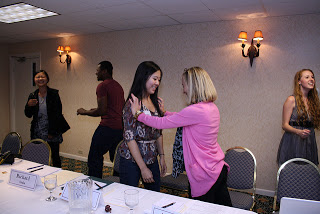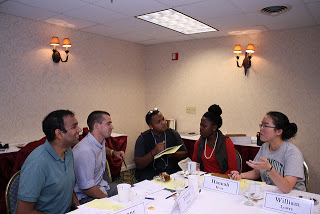- Public Policy
- Leadership
- Funding
- News & Events
- About the Center
Back to Top Nav
Back to Top Nav
Back to Top Nav
Back to Top Nav

Susan Miller used a series of exercises to convey to the Fellows the importance of effective communication. Public speaking is an art that can be learned with the help of tools like “IPOP,” an acronym for intention, presence, open your mouth, and pity message. These four in combination maximize a speaker’s success and created a rubric by which the Fellows could evaluate real-world examples. Prior to the session, we had watched a series of short speeches including Kate Middleton’s first public address and Tim Tebow’s press conference for the Jets. We systematically picked apart each example, commenting on the categories the speakers could have improved upon. In the session’s crowning moment, the fellows were challenged to use IPOP in order to come up with their own “ elevator speech.” An effective, or as some Fellows might offer, terrifying, means of putting theory in practice, each speaker left with a better understanding of the tools necessary for effective communication.

Additionally, Brian Mandell, Senior Lecturer of Public Policy at the Kennedy School of Government, ran a two-part session on the art and science of negotiation. The sessions dovetailed with Susan Miller’s, stressing the importance of effective communication, as well as active listening and collaborative problem solving. The Fellows attempted to put his words into practice in “The Available Heart” exercise, in which smaller groups of Fellows were given a few details of seven patients in need, and charged with negotiating who would receive the one available donor heart. With one round completed, Fellows were then given more details of each patient, and asked to repeat the exercise. The successive cycles enabled the participants to review their methodology, whether or not it was effective in each situation, and evaluate their individual performance. The review prompted a fruitful discussion and questions including one from Fellow Elizabeth Hoffman, who asked Professor Mandell to explicate the role of empathy in negotiation. The skills learned throughout both sessions cumulated in a 75-minute exercise in which each Fellow was assigned a role in securing a licensing agreement for a fictitious deep-water port. Success in the negotiated settlement was determined by achieving a number of points specific to each party. The outcome was complicated by the fact that one of the six parties would not be able to achieve this outcome, and would lose the exercise. The simulation compelled Fellows to apply theory to practice and learn the art of getting to yes.